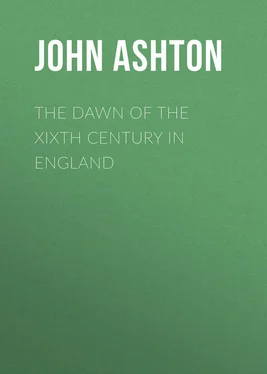John Ashton - The Dawn of the XIXth Century in England
Здесь есть возможность читать онлайн «John Ashton - The Dawn of the XIXth Century in England» — ознакомительный отрывок электронной книги совершенно бесплатно, а после прочтения отрывка купить полную версию. В некоторых случаях можно слушать аудио, скачать через торрент в формате fb2 и присутствует краткое содержание. Жанр: foreign_antique, foreign_prose, на английском языке. Описание произведения, (предисловие) а так же отзывы посетителей доступны на портале библиотеки ЛибКат.
- Название:The Dawn of the XIXth Century in England
- Автор:
- Жанр:
- Год:неизвестен
- ISBN:нет данных
- Рейтинг книги:3 / 5. Голосов: 1
-
Избранное:Добавить в избранное
- Отзывы:
-
Ваша оценка:
- 60
- 1
- 2
- 3
- 4
- 5
The Dawn of the XIXth Century in England: краткое содержание, описание и аннотация
Предлагаем к чтению аннотацию, описание, краткое содержание или предисловие (зависит от того, что написал сам автор книги «The Dawn of the XIXth Century in England»). Если вы не нашли необходимую информацию о книге — напишите в комментариях, мы постараемся отыскать её.
The Dawn of the XIXth Century in England — читать онлайн ознакомительный отрывок
Ниже представлен текст книги, разбитый по страницам. Система сохранения места последней прочитанной страницы, позволяет с удобством читать онлайн бесплатно книгу «The Dawn of the XIXth Century in England», без необходимости каждый раз заново искать на чём Вы остановились. Поставьте закладку, и сможете в любой момент перейти на страницу, на которой закончили чтение.
Интервал:
Закладка:
There were also very many refugees here who were not prisoners of war, and, in order to keep them under supervision, a Royal Proclamation was issued on the 12th of October, citing an Act passed the last session of Parliament, respecting the Registration of Aliens, and proclaiming that all aliens must, within eighteen days from date, register themselves and their place of abode – if in London, before the Lord Mayor, or some magistrate at one of the police offices; if in any other part of Great Britain, before some neighbouring magistrate.
However, enemies nearer home were plaguing John Bull. “Mannikin Traitors” verily, but still annoying. Then, as now, England’s difficulty was Ireland’s opportunity; and of course, the chance was too tempting to be resisted. The Union (curious phrase!) was but in the third year of its existence, and Ireland was once more in open rebellion. Chief of the spurious patriots was one Robert Emmett, whose picture in green and gold uniform coat, white tights and Hessian boots, waving an immense sword, appears periodically, in some shop windows, whenever Irish sedition is peculiarly rampant, only to disappear when the inevitable petty rogue, the approver, has done his work, and the windbag plot is pricked.
Emmett was the son of one of the State physicians in Dublin, and brother to that Thomas Eddis Emmett, who was prominent in the rebellion of 1798. Robert had so compromised himself, by his speech and behaviour, that he deemed it wise to live abroad during the suspension of the Habeas Corpus Act, but he returned when his father died, having become possessed of about £2,000, which he must needs spend, in “regenerating” Ireland.
Silly boy! (he was only twenty-four) with such a sum, and about one hundred followers, he thought it could be done. His crazy brain imagined his down-trodden compatriots hastening to his side, to fight for the deliverance of their beloved country from the yoke of the hated Saxon despot. There were meetings sub rosâ – assemblages on the quiet – as there always will be in Ireland when the pot is seething; and at last the curtain was to be drawn up, for the playing of this farce, on the 23rd of July, when towards evening, large bodies of men began to assemble in some of the streets of Dublin – but vaguely, and without leaders.
At last a small cannon was fired, and a single rocket went upwards to the sky; and the deliverer, Emmett, sallied out, waving that big sword. A shot from a blunderbuss killed Colonel Browne; and the Lord Chief Justice of Ireland, Lord Kilwarden, and his nephew, Rev. Richard Wolfe, were dragged from their carriage, and brutally murdered.
A little more bluster, and then, some three hours after its rising, this scum was put down by about one hundred and twenty soldiers. The ringleaders were caught and executed. Emmett, tried on the 19th of September, was hanged next day.
To show how slowly news travelled in those days, the Times has no notice of this riot on the 23rd till the 28th of July, and then not a full account. The Government, however, seems to have estimated the situation quite at its full gravity, for there was a message from the King to his faithful Parliament on the subject; the Habeas Corpus Act was once more suspended, and martial law proclaimed.
On the 19th of October the religious panacea of a general fast was tried, and “was observed with the utmost decorum” in the Metropolis. The Volunteers, especially, won the encomia of the Times for their goodness in going to church, and the Annual Register also warms up into unusual fervour on the occasion: “Such a number of corps attended this day, that it is impossible to enumerate them. Every principal church was crowded with the ardent patriots who fill the voluntary associations; and there can be no doubt that, in the present temper of the people of this country, not only every other great city and town, but even the smallest village or hamlet throughout the island, evinced a proportionate degree of fervour and animation in the holy cause. The corps who had not before taken the oath of allegiance, did so this day, either on their drill grounds, or in their respective churches.”
Of the latter part of the year, other than the Invasion Scare, there is little to say. Among the Acts passed this year, however, was one of hopeful import, as showing a glimmer of a better time to come in the era of religious toleration. It was to relieve the Roman Catholics of some pains and disabilities to which they were subject, on subscribing the declaration and oath contained in the Act 31 George III.
Three per Cent. Consols opened this year at 69; dropped in July to 50, and left off the 31st of December at 55.
Bread stuffs were cheaper, the average price of wheat being 77s. per quarter, and the quartern loaf, 9d.
CHAPTER XI
Caricatures of the Flotilla – Scarcity of money – Stamping Spanish dollars – Illness of the King – His recovery – General Fast – Fall of the Addington Ministry – Debate on the Abolition of the Slave Trade – Beacons – Transport – Election for Middlesex – Reconciliation between the King and the Prince of Wales.
THE YEAR 1804 opens with Britain still in arms, watching that flotilla which dare not put out, and cannot be destroyed; but somehow, whether familiarity had bred contempt, or whether it had come to be looked upon as a “bugaboo” – terrible to the sight, but not so very bad when you knew it – the patriotic handbills first cooled down, and then disappeared, and the satirical artist imparted a lighter tone to his pictures. Take one of Gillray’s (February 10, 1804): “The King of Brobdingnag and Gulliver” (Plate 2). Scene – “Gulliver manœuvring with his little boat in the cistern,” vide Swift’s Gulliver : “I often used to row for my own diversion, as well as that of the Queen and her ladies, who thought themselves well entertained with my skill and agility. Sometimes I would put up my sail and show my art by steering starboard and larboard. However, my attempts produced nothing else besides a loud laughter, which all the respect due to His Majesty from those about him, could not make them contain. This made me reflect how vain an attempt it is for a man to endeavour to do himself honour among those who are out of all degree of equality or comparison with him!!!” The King and Queen look on with amusement at the pigmy’s vessel, for the better sailing of which, the young princes are blowing; and creating quite a gale.
Take another by West (March, 1804), which shows equally, that terror is turning to derision. It is called “A French Alarmist, or, John Bull looking out for the Grand Flotilla!” John Bull is guarding his coast, sword on thigh, and attended by his faithful dog. Through his telescope he scans the horizon, and is thus addressed by a Frenchman who is behind him. “Ah, ah! Monsieur Bull, dere you see our Grande Flotilla, de grande gon boats, ma foi – dere you see ‘em sailing for de grand attack on your nation – dere you see de Bombs and de Cannons – dere you see de Grande Consul himself at de head of his Legions? Dere you see – “ But John Bull, mindful of the old saying, anent the Spanish Armada, replies, “Monsieur, all this I cannot see, because ’tis not in sight.”
Money was scarce in this year; and in spite of the all-but million given the King not so long since to pay his debts, we find ( Morning Herald , April 26, 1804), “The Civil List is now paying up to the Lady-day quarter, 1803.”
So scarce was money — i. e. , bullion – that a means had to be found to supplement the currency; and it so happened that a large quantity of Spanish dollars were opportunely taken in prizes. In 1803 the idea of utilizing these as current English coins was first mooted, and some were stamped with the King’s head, the size of the ordinary goldsmith’s mark; but in 1804 a much larger issue of them was made, and they were stamped with a profile likeness of the King, in an octagon of about a quarter of an inch square. They were made to pass for five shillings each, which was about threepence-halfpenny over their value as bullion; and this extra, and fictitious, value was imposed upon them in order that they should not be melted down. They were also to be taken back for a time at that price, and on the 12th of January, 1804, every banking house received £1,000 worth of them from the Bank of England, against the Bank’s paper. But, as currency, they did not last long, the Bank refusing, as early as April the same year, to receive them back again, on “various frivolous and ill-founded pretensions.” For some reason, probably forgery, they were recalled, and on the 22nd of May there was a notice in the Gazette
Читать дальшеИнтервал:
Закладка:
Похожие книги на «The Dawn of the XIXth Century in England»
Представляем Вашему вниманию похожие книги на «The Dawn of the XIXth Century in England» списком для выбора. Мы отобрали схожую по названию и смыслу литературу в надежде предоставить читателям больше вариантов отыскать новые, интересные, ещё непрочитанные произведения.
Обсуждение, отзывы о книге «The Dawn of the XIXth Century in England» и просто собственные мнения читателей. Оставьте ваши комментарии, напишите, что Вы думаете о произведении, его смысле или главных героях. Укажите что конкретно понравилось, а что нет, и почему Вы так считаете.












